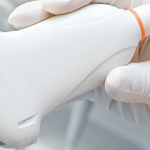
It’s all in the hands.
Nearly 10 million Americans suffer from carpal tunnel syndrome, a condition that disables a key nerve in the wrist resulting in numbness, tingling, weakness, and loss of function in the hands and wrist. These symptoms are similar to those of rheumatoid arthritis and other rheumatic conditions, and it is important that patients know the difference.
Providing patient education is one of the most powerful actions a rheumatology health professional can take to help people with rheumatic diseases. In fact, a recent study published in the Journal of Clinical Rheumatology suggests that access to health information can improve patient outcomes.1 Other studies have found that providing clear and simple health instructions could reverse high hospital readmission, complication, and death rates.2
“The ACR Communications and Marketing Committee is working with members to update more than 40 fact sheets by the end of the 2012 calendar year,” says Eric Matteson, MD, MPH, chair of the committee and chief of rheumatology at the Mayo Clinic College of Medicine in Rochester, Minn. “The patient fact sheets will also maintain a readability level of ninth grade or lower to ensure that the information is easy to understand.”
Give your patients a helping hand by providing information about carpal tunnel syndrome and other rheumatology diseases, medications, and topics in your waiting and exam rooms or during visits. ACR fact sheets are free and can be accessed by visiting www.rheumatology.org and clicking on “Patient Resources” under “Popular Content.”
Additionally, as mentioned in the October issue of The Rheumatologist (“Empower Rheumatology Patients), ACR patient fact sheets will be featured several times a year in “From the College.”
References
- Swearingen CJ, McCollum L, Daltroy LJ, Pincus T, DeWalt DA, Davis T. Screening for low literacy in a rheumatology setting: More than 10% of patients cannot read “cartilage,” “diagnosis,” “rheumatologist,” or “symptom.” J Clin Rheum. 2010:16;359-364.
- Boodman SG. Many Americans have poor health literacy. The Washington Post. www.washingtonpost.com/wp-dyn/content/article/2011/02/28/AR2011022805957.html. Updated February 28, 2011. Accessed December 12, 2011.


